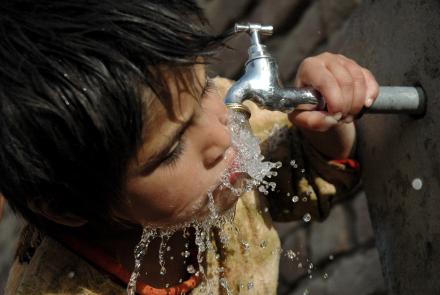
Image by World Bank Photo Collection on flickr.
Free flow
A new research project involving the Crawford School and the World Bank hopes to give 600 million people in the world’s poorest countries access to safe water.
For so many of us fortunate enough quenching our thirst is a simple matter of turning on the tap and soaking up the sweet taste of cool, clean, fresh water. But, the next time you take a gulp spare a thought for the world’s poorest – for so many of them water is a matter of life and death.
Around the world 600 million people don’t have access to safe water and 2.5 billion don’t have access to sanitation. In addition, one billion people still practice open defecation in water ways, and 768 million people use an unimproved source for drinking water.
These are just some of the scary figures collected by the World Bank’s Water and Sanitation Program (WSP) – a collaboration between the World Bank and the United Nations Development Programme (UNDP). The WSP is the longest running global partnership program administered by the World Bank, and hopes to give the poorest people in the world access to improved water and sanitation.
Now it is teaming up with the Crawford School to investigate how we can stem the tide.
Jaehyang So, Manager of WSP at the World Bank was recently in Canberra to discuss a WSP report, Tapping the Markets: Opportunities for Domestic Investments in Water and Sanitation for the Poor, co-authored by Crawford School’s Bob Warner.
So said there’s still much work to be done to improve water and sanitation access for developing countries.
“We have less than 1,000 days left for the world to assess whether the millennium development goals have been met and there is a responsibility from all of us to ensure that everybody in the world receives basic access to basic services.
“Even though the goals for water have been met, there are still over 600 million people in the world that don’t have basic access to water and 2.5 billion people in the world that don’t have basic access to sanitation.
“The UN announced earlier this year that the world had met the MDG in water but the world would not meet the MDG in sanitation.
“We need to remember that these goals aren’t that every person in the world has access to basic water and sanitation and this is something we need to continue to strive for,” she said.
So says many lessons have already been learnt from the study; one of those is to rethink the way they’ve been approaching the issue of access in the water and sanitation sector.
“The study looked at finding the best way to achieve universal access to water and sanitation, especially for the poorest and what we’ve realised is that it cannot be done one village at a time and we have to think very differently about how to achieve scale,” she said.
She added that countries do not have the capacity to meet the need for improved water supplies and sanitation services from public resources alone.
“First the provision of basic services like water and sanitation is the responsibility of the government to its citizens. But that doesn’t mean the government has to regulate, implement, provide and finance.
“The study decomposes the potential roles that are needed to increase access and then tries to analyse the strengths of the public or private sector to achieve these roles.
“The second major finding is that poor people have very similar customer demand needs to those in the rest of the population.
“Rather than thinking of poor people as beneficiaries we need to think of them as customers and really understand their needs and decisions criteria for how to purchase water and sanitation,” she said.
So added that she was delighted to develop the study in conjunction with Crawford School.
“In order for us to really understand this issue we thought it was very important to partner with the Crawford School to really benefit from the knowledge and the expertise in how to design public policies and how to ensure the maximum impact.”
Read the report: http://www.wsp.org/sites/wsp.org/files/publications/DPSP-Sanitation-Repo...
Watch an interview with Jaehyang So: http://on.fb.me/18mKuC7
Updated: 12 July 2024/Responsible Officer: Crawford Engagement/Page Contact: CAP Web Team













